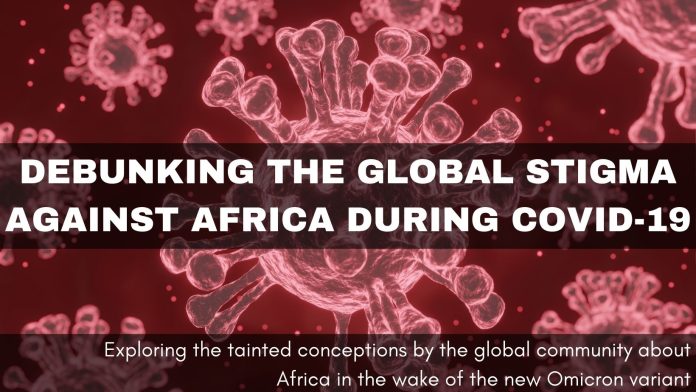From the earth-shaking onset of the coronavirus in 2019, the World Health Organization has since reported over 250 million confirmed cases of COVID-19 on a global scale.
With over a staggering 2 million COVID-19 related deaths reported worldwide, the pandemic has proven to negatively affect not only the global economy but the life expectancies of people from all corners of the globe.
However, with the recent new COVID variant Omicron emerged a stigma against Africa that challenges the world to reflect. So, let’s look at this stigma closer.
The Impact of COVID-19 on Africa
Viewed primarily as a global health issue, the COVID-19 pandemic has proven to highlight major social inequalities worldwide and, as a direct result of the challenges faced by Africa’s agro-food industry and healthcare systems, socio-economic disruption caused by the pandemic has amassed in devastating effects on millions of Africans in a multitude of ways, some of which include (according to local and global news reports):
- The loss of businesses and a subsequent rise in unemployment.
- Increased food insecurity due to strained economies.
- Curbed gains made in poverty alleviation.
- The socio-economic impact of COVID-19 related fatalities on African families.
- Detrimental implications on livelihoods, mental health, and general well-being.
Omicron & Africa’s Regressing Global Reputation
In late November 2021, the World Health Organization warned that the global risk from the Omicron variant is “very high” based on early evidence suggesting that the mutated coronavirus could lead to surges with “severe consequences”.
When compared to Europe and the United States, Africa has been without the necessary vaccines and resources at its disposal to fight against COVID-19 and yet reports of Africa’s far superseding progress from the onset of the pandemic remain remarkably notable, with deaths in Africa making up just 3% of the global total whereas, in comparison, deaths in the Americas and Europe account for 46% and 29%.
Despite being accredited by the World Health Organization as one of the least affected regions in the world with fewer than 6% of its population vaccinated, Africa has nonetheless been put under severe scrutiny by the global community and is receiving the most flack about the corrosive implications posed by the continent’s newly discovered Omicron variant to the world at large.
With its origins still unknown, all the while being the first country on the globe to have reported the Omicron variant to the World Health Organization, South Africa and other neighbouring countries have been struck with international travel bans instated by leading world countries in an attempt to contain the spread on the new variant.
The Scope of Africa’s Global Shunning
The US, UK, Israel, and the 27 member states of the European Union are among those who’ve enforced travel bans mostly targeted at Southern African countries.
“The last thing we need is to bring in a new variant that will cause even more problems.” – German Health Minister Jens Spahn.”
Italy’s health ministry has announced measures to ban entry into Italy of anyone who has been in seven Southern African nations including South Africa, Lesotho, Botswana, Zimbabwe, Mozambique, Namibia, and Eswatini. The Netherlands and the Czech Republic are planning similar measures.
The Japanese government recently announced that Japanese nationals traveling from Eswatini, Zimbabwe, Namibia, Botswana, South Africa, and Lesotho will have to quarantine at government-dedicated accommodation for 10 days and undergo COVID-19 tests on days 3, 6, and 10. Japan has not yet opened up its borders to foreign nationals.
Potentially aiding in remedying the UK’s current migrant crisis, it can be argued that the stigma attached to the African continent in the wake of the Omicron revelation has subsequently resulted in travel restrictions being put in place on travellers arriving in the UK from South Africa.
“Early indications show this variant may be more transmissible than the delta variant and current vaccines may be less effective against it. We must move quickly and at the earliest possible moment” – British Health Secretary Sajid Javid.
With the globally toxified sentiments surrounding the Omicron variant and its association with South Africa now permeating into the sporting arena, the actions taken by the UK government in banning flights from South Africa recently led to a batch of British and Irish golfers withdrawing from the Joburg Open.
Travel Ban Outcry: The World’s Swift Rebuttal
On account of the Omicron variant, mounting efforts enacted by leading countries to keep Africans outside of their borders have since led to Kenya’s President Uhuru Kenyatta’s plea to global countries to withhold placing travel bans on Africa.
Commenting on the matter during his last state of the nation address ahead of next year’s general election in Kenya, President Kenyatta made mention of:
- Great progress by African countries in tackling coronavirus since it was first detected, adding that the new Omicron variant would not be defeated by locking off or shutting down the continent.
- Kenya’s vaccination count amounting to more than seven million people, about 13% of the population, against a set target of 10 million by December 2021.
- Kenya’s improved health infrastructure since March 2020 when Covid-19 was first declared a pandemic.
Seamlessly entering into the fray, the Africa Centres for Disease Control and Prevention has also raised a compelling counterargument by strongly discouraging the imposition of travel bans for people originating from countries that have reported the Omicron variant, stating:
“Over the duration of this pandemic, we have observed that imposing bans on travelers from countries where a new variant is reported has not yielded a meaningful outcome.”
Considering the sordid convictions and actions taken against African counties from the onset of the Omicron variant and its supposed origins, it’s also paramount to acknowledge conflicting attitudes surrounding the stigma that has been expressed by influential public figures residing in countries outside of the African continent:
Omicron is not a ‘South African variant’, it’s a variant that was spotted & reported by brilliant South African scientists so fast the world has a chance to get on top of it. Could have originated anywhere.
— Piers Morgan (@piersmorgan) November 27, 2021
Take it from a South African: the Omicron travel ban is bulls**t pic.twitter.com/PLHW6yUlyf
— The Daily Show (@TheDailyShow) November 30, 2021
Reversing the Stigma: Give Africa a Break
With opinions divided and tempers flared worldwide, the World Health Organization has issued a warning to global nations not to be too quick to jump to conclusions or act too hastily.
The South African government has since said in a statement that:
“The U.K.’s decision to temporarily ban South Africans from entering the U.K. seems to have been rushed as even the World Health Organization is yet to advise on the next steps.”
Speaking before the European Union, Dr. Michael Ryan, the head of emergencies at the World Health Organization stated:
“It’s really important that there are no knee-jerk responses. We’ve seen in the past, the minute there’s any kind of mention of any kind of variation and everyone is closing borders and restricting travel. It’s really important that we remain open, and stay focused.”
With reported cases of the Omicron variant beginning to surface in regions across the globe including multiple US states and the Netherlands, the global community must act as a catalyst for progressive change underpinned by inclusivity, as opposed to taking an ‘out of sight, out of mind’ approach in tackling today’s challenges surrounding the pandemic, thereby causing major disruptions in global cooperation.
South African Professor Tulio de Oliveira, the director of the KwaZulu-Natal Research Innovation and Sequencing Platform (Krisp), has since spoken out against the global shunning of Africa, urging global nations to unify and lend a helping hand during this time of great uncertainty:
Busy day on B.1.1.529 – a variant of great concern – The world should provide support to South Africa and Africa and not discriminate or isolate it! By protecting and supporting it, we will protect the world! A plea for billionaires and financial institutions. 1/8 tweets
— Tulio de Oliveira (@Tuliodna) November 25, 2021
Instead of shutting Africa out and essentially wishing away the Omicron variant in the process, there needs to be a shift in focus from what’s transpired in recent weeks and how the coronavirus mutation could’ve been avoided to the positive efforts that are currently underway to subdue the Omicron variant altogether, regardless of its unknown origins.
With South Africa accelerating its vaccination campaign through pop-up sites in local shopping centres and transportation hubs in the wake of the Omicron variant, the shadow of intolerance cast over Africa by the global community hasn’t soiled the continent’s efforts to combat the coronavirus mutation head-on despite the limited resources Africa currently has at its disposal.
Let’s hope the world takes notice and answers Africa’s call for more inclusive measures in tackling COVID-19 and the Omicron variant. Or that it will be a wake up call for all world leaders to understand that this pandemic is a global problem, which cannot be fully controlled and isolated and that requires collaboration rather than discrimination.





























